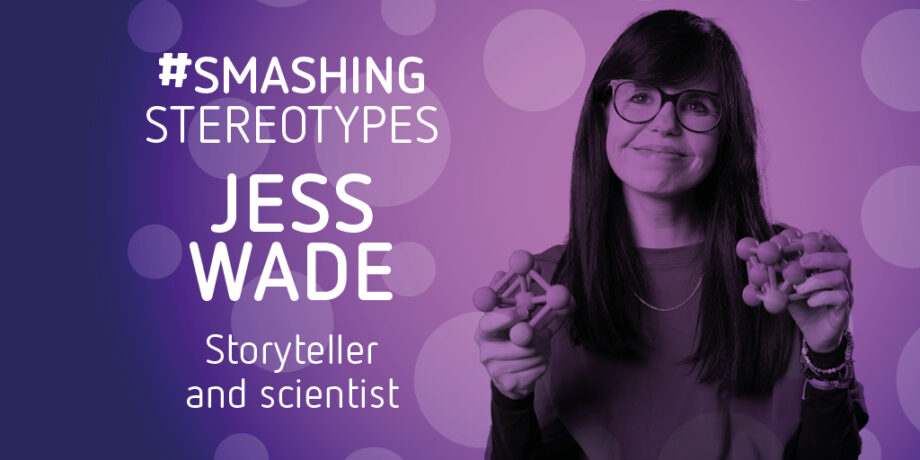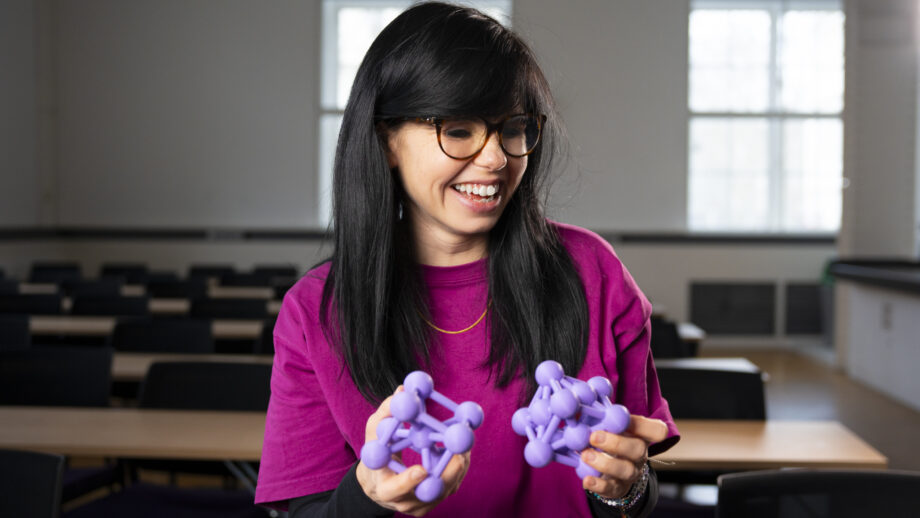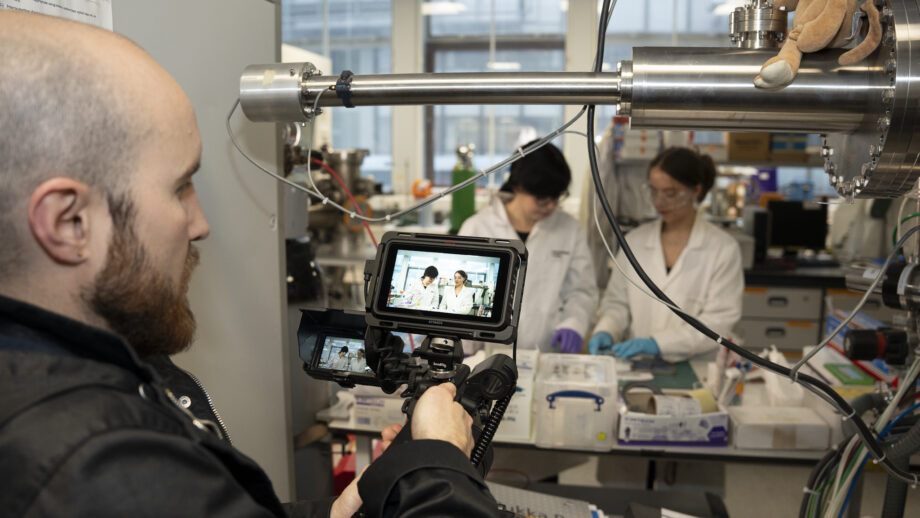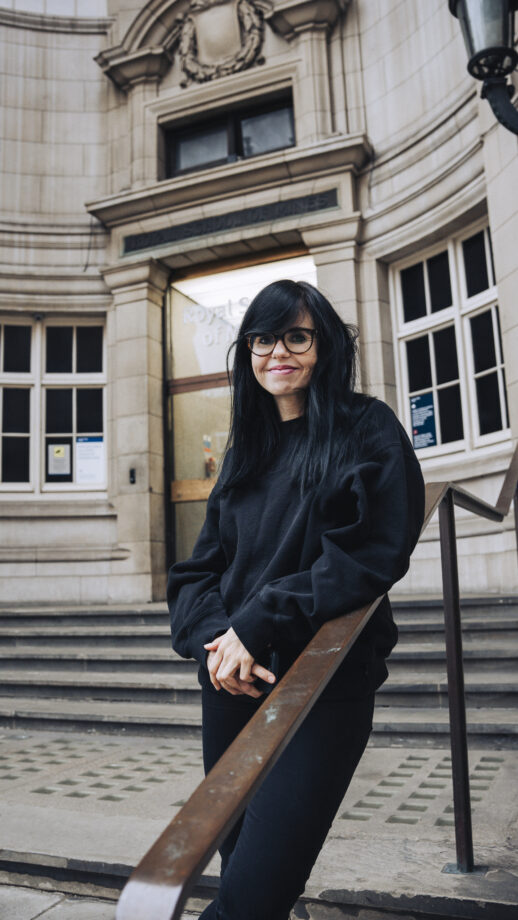
Dr Jess Wade
Storyteller and scientist
Lecturer in Materials Science at Imperial College London
Beyond the lab: making science education more inclusive for all
Dr Jess Wade is a Lecturer in Materials Science and Royal Society University Research Fellow at Imperial College London. Jess is passionate about science communication and initiatives to support underrepresented groups’ access to science. Her contributions to change and innovation have earned her the Rising Talents Fellowship in the Physical Sciences category in the L’Oréal-UNESCO For Women in Science UK and Ireland Rising Talents Programme 2021.
Nurturing my curiosity and thirst for knowledge
As a child, I had no idea that people had jobs as scientists. You’re not aware that it’s a career path, so I hadn’t ever really considered it. But I always knew I wanted to do something that involved teaching, helping people, and making discoveries.
My parents are both medical doctors, so I always knew I was interested and curious about science. When you grow up amongst people who work in the NHS, you want to work in something that benefits everyone. I also had really good teachers at high school for chemistry, physics and art.
Throughout school, I became more and more fascinated by science, particularly by the intersection of chemistry and physics. Maths enabled me to understand everything from molecules and subatomic particles to infinitely large—galaxies and universes.
From painting to physics in the lab
I was encouraged at school to study things that I found interesting, so I spent a year studying art. I enjoyed exploring the interaction of light and materials (or ‘chiaroscuro’), architecture, textures. I think that intersection between the arts and sciences is so captivating and often ignored.
I lived in Florence for a while studying the Renaissance, then came back to the UK to start an undergraduate degree in physics. During a physics degree you are introduced to a lot of science that can be used to benefit society. Throughout my degree I managed to do lab projects and research placements where I was using physics to create a better world. I worked on enhancing the efficiency of photovoltaics and developing less energy-intensive light-emitting diodes.

Molecules for good
As materials scientists we contribute to change and innovation. The molecules I work on are incredibly exciting and transformative, with the potential for significant impacts in various technologies. This includes things like brain imaging, water electrolysis (splitting water with electricity) and safety testing.
The breakthroughs we achieve in the lab could be revolutionary, and the researchers trained in our lab won’t just become outstanding scientists, they will act as beacons for a more inclusive future.
Since much of our science is funded by taxpayers, we have an inherent responsibility to communicate our findings to society, the people who make our work possible. This involves being socially conscious science communicators who are just as comfortable explaining what we do to a technical audience at a scientific conference as we are in a jargon-free chat in a coffee shop.
Just like you learn how to use a new piece of equipment or implement a new algorithm, you can learn how to be a better communicator. Imperial even have a Master’s course on Science Communication for the super keen.
Paving the way for others and inspiring science futures
I’m most happy when I’m supporting or training others. Any contribution I can make from an equity and diversity perspective to break down stereotypes is something I love. I feel incredibly lucky to have the job I do, and a responsibility to help others discover how awesome science careers are.
I became more aware of stereotypes and privilege, and how this affects the opportunities available to people during my undergraduate degree. It was clear that historically underrepresented groups faced a bunch of barriers entering the field. Physics, as I’m sure you know, is incredibly male-dominated and White, and most students come from relatively affluent backgrounds.
Most high school students in the UK won’t be taught physics by a specialist science teacher, someone who has studied physics beyond school-level. Schools and teachers may not be able to provide beyond-the-curriculum knowledge, careers advice or inspiration through no fault of their own.
I’ve worked with students, teachers, parents, research councils, and university outreach teams to think about how we can better inspire, educate, and keep students interested in subjects like physics and engineering. This has translated into bigger scale online and offline projects that relate to people, and tune into their enthusiasm and curiosity.

A creative and long-term vision for science education
I’m interested in science outreach initiatives that have evidence behind them. I don’t think it’s possible to inspire young people to study physics with one-off interventions during students’ lunch hours. The Institute of Physics’ ‘Girls in Physics’ studies have shown that long-term engagement with relatable role models, whole-school initiatives and careers guidance can enhance young people’s aspirations.
We have to be more creative and long term in our vision for equality. For the last few years my focus has shifted to considering how can we better support a generation of more ‘diverse’ scientists so that we don’t only help them enter the scientific workforce but also have exciting, impactful careers.
Overcoming doubt and imposter syndrome in academia
Being a lecturer is an incredible privilege but can be quite intimidating! You have to stand up and teach a room of about 150 students, and make exciting, relevant and thorough teaching resources.
So-called “impostor syndrome” is quite common in academia because of the hierarchical nature and competitive processes you go through to become a lecturer or professor. The system has a knack for making people feel that they need to be better and do more. You need to be knowledgeable and have a deep understanding for the subject matter, as well as the developments within it, and what other academics and researchers are doing.

Words of reassurance for aspiring scientists and academics
It’s vital to have people around you who remind you that you deserve to be there and have worked so hard to get there.
We all go through moments of self-doubt, where you might struggle to recognise your value or know who to turn to for support. There may be times where you have questions, or need help, but hold back from asking because you don’t want to look incompetent. Then you have the added challenge of trying to do a job, which is quite technically complex, but also trying to change the system and help those who are underrepresented people access it too. We all want to support the next generation, we want to help, and give people advice to help them succeed.
I hope it’s reassuring for any young people reading this to know that even the people teaching, lecturing, and mentoring you feel out of their depth, at times. School, university, and your career are all spaces to learn and develop your confidence, find your passion and make the world a better place for other people. Science and engineering will provide the solutions that help us protect the planet and people we love. We need you to join us!